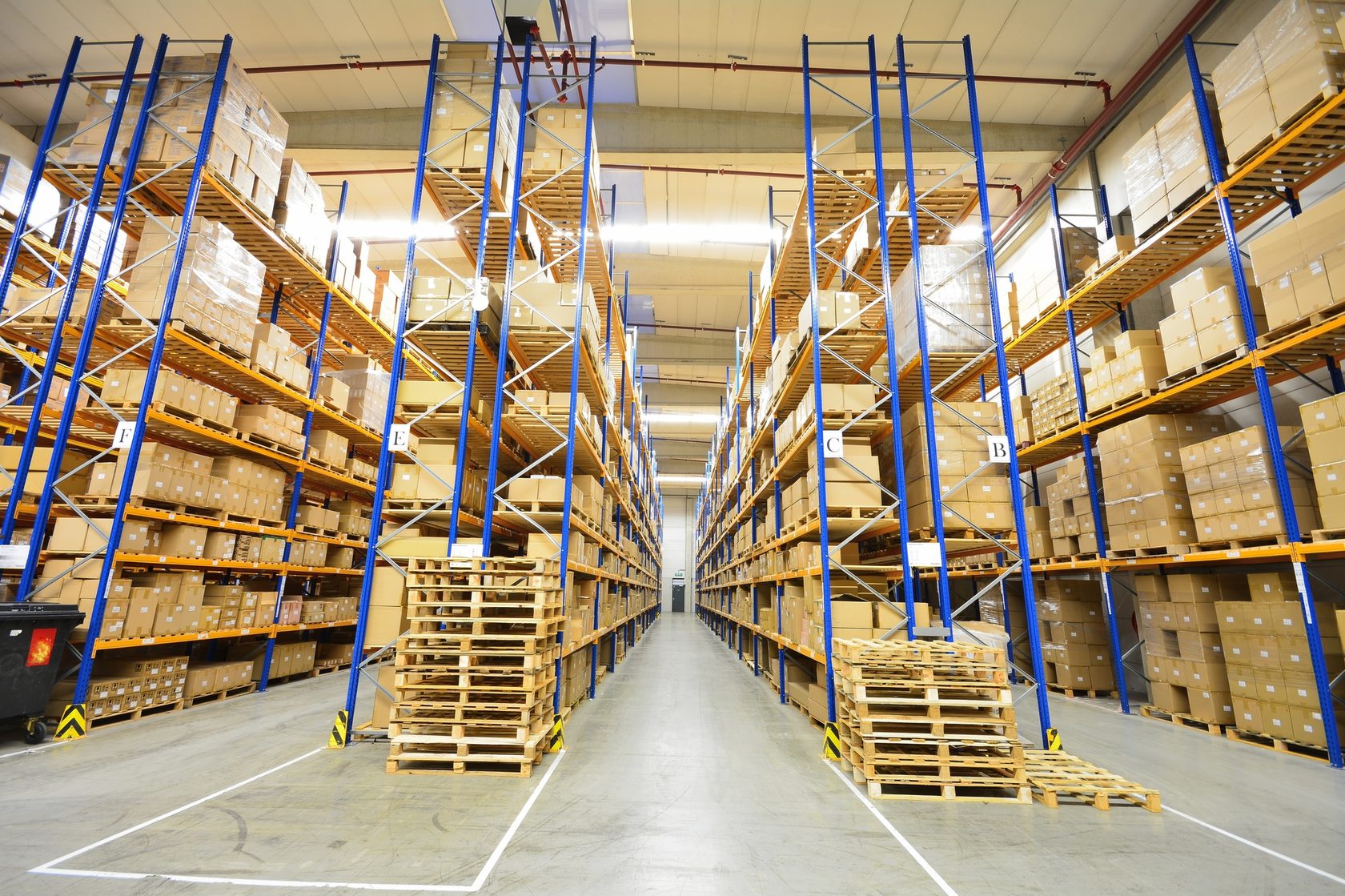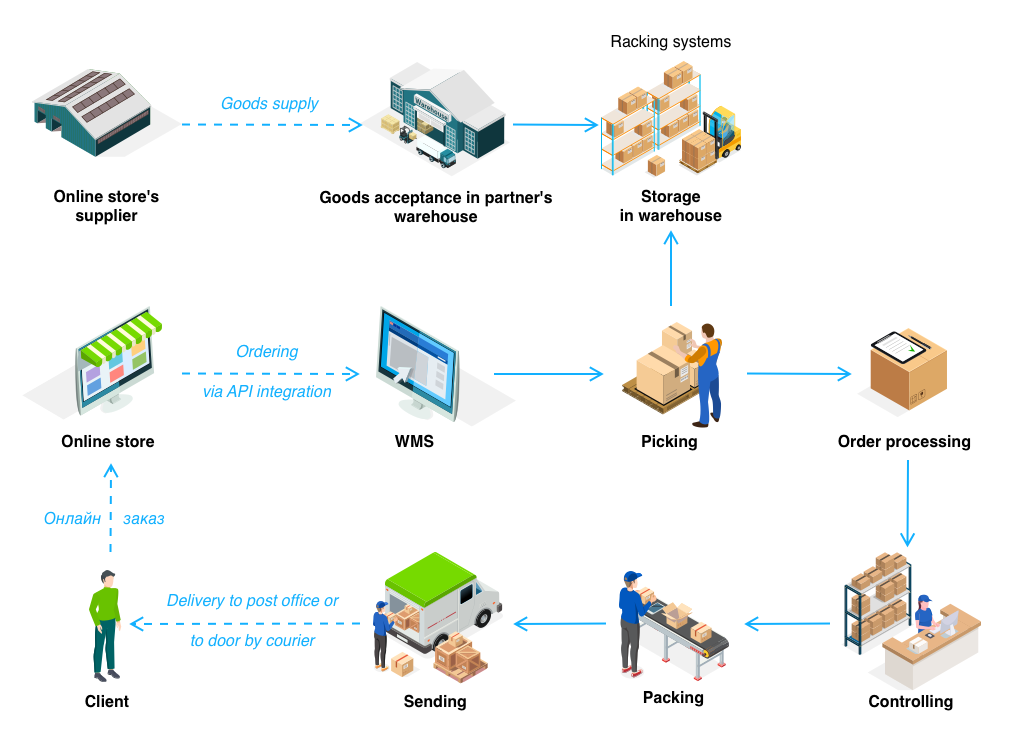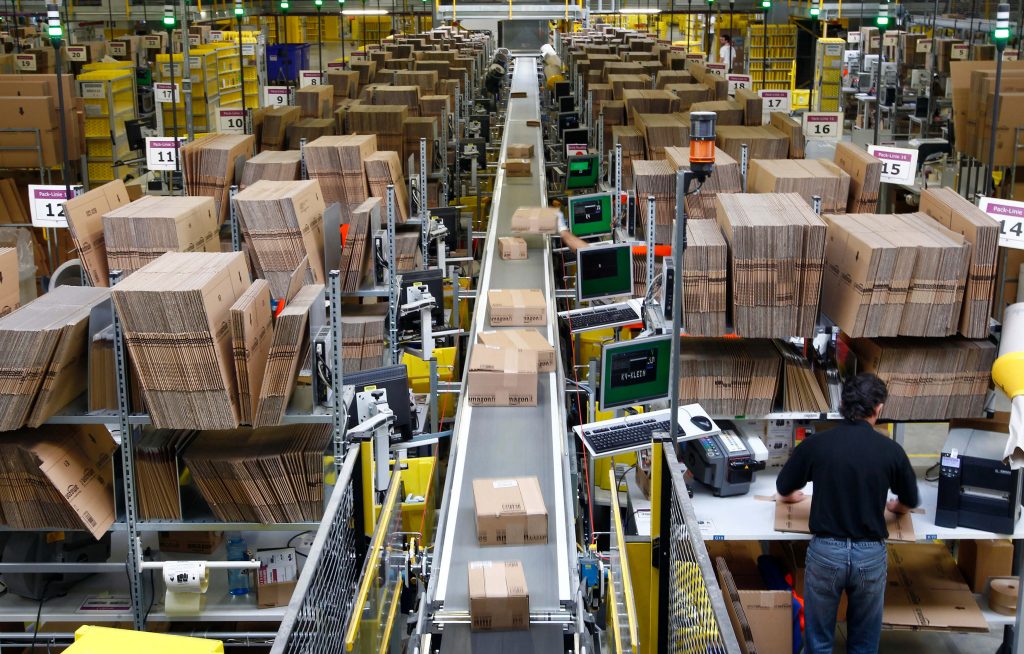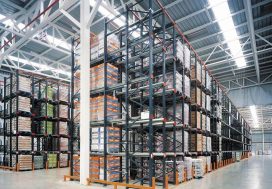
- What does the term “fulfillment” mean in logistics?
- What does a company need to implement its fulfillment processes?
- Order receiving
- Goods storage features
- Order assembling
- Goods packing
- Work with delivery service
- Returns processing
- With what types of goods do fulfillment providers work?
- What is the difference between fulfillment centers and 3PL warehouses?
- Conclusions: Fulfillment is a required logistics service
The eCommerce market is growing rapidly. Since the beginning of the COVID-19 pandemic, more and more buyers prefer buying online. Therefore, online retailers faced a new challenge: organizing order processing, goods storage, and delivery to the customer at optimal cost and maximum efficiency? Logistics outsourcing can be a solution. Today in Ukraine, retail networks and online stores can use a fulfillment service.
In this article, WareTeka gathered information on what fulfillment is, what its main features are, and how to organize an internet store logistics with the service.
What does the term “fulfillment” mean in logistics?
Fulfillment (or order fulfillment) is a complex of operations with goods from the moment of order processing until its delivery to a buyer. In simple words, fulfillment is a complex of operations for order processing, which includes storage, packaging, packing, delivery, and return operations. The service is provided by specialized companies. Shops are engaged in advertising and promotion, and a provider — in secondary processes. Shipment and delivery times are shorter, and the price for order assembling is lower. So, the result of cooperation with a fulfillment provider is increasing store sales level.
Such a service was launched by Amazon. Over time, the company began to take on the logistics of other stores. Fulfillment is generally used by companies that send over 100 orders per month and plan to expand their business in the next two years. It can also be useful for online shops where turnover is not so high and sales increase seasonally.
The logistics provider is an intermediary in a seller-buyer chain. Fulfillment involves not only logistics but also interaction with a buyer. Partner companies accept customers’ orders, advise clients (if a provider also performs call center service), and process returns in case a customer refuses to buy. A warehouse manager resolves all issues of goods receiving and dispatching. A provider is also responsible for the goods’ losses.
If up to 5 orders per day are made in an online store, cross-docking, another fulfillment service, can be suitable. Goods are not stored in a warehouse, and after the order is made a fulfillment provider takes the goods from a supplier or from an internet store itself, assembles the order in its warehouse, and sends it to a consumer.
What does a company need to implement its fulfillment processes?
The online shops’ logistics can be divided into warehousing and transportation processes. While online stores outsource transportation regularly, warehouse logistics outsourcing is a less popular service. 3PL providers are usually engaged in larger projects, so a businessman who has just launched an internet store has to organize his fulfillment on his own.
The fulfillment process is based on specialized IT solutions that organize the entire Warehouse Management System (WMS). However, for online shops, it is necessary to develop WMS that can work with small-scale goods. Most of the software is designed for offline storage tasks, and the online shops’ logistics are very different. If Excel can be used for the first time, it is necessary to introduce an automation system if the number of orders increases.
What are the online retailer’s requirements for a Warehouse Management System?
- Ability to work with a large number of stock-keeping units (SKU);
- Availability of warehouse equipment (data collection terminals, scanners, scales, etc.);
- Recording of each item;
- Сell-based storage;
- Warehouse space zoning.
If we consider fulfillment as a business process, we can divide it into six stages. Its ultimate goal is to fulfill an order.
Order receiving
The speed and efficiency of a whole process depending on the first step. For some goods, receiving is easy. For example, if a product is labeled with a barcode. But if there is no identifier (this situation happens quite often), the product must be recognized. This is necessary to control its availability in a warehouse. For this purpose, each unit is labeled with a unique number. If WMS allows you to store and operate this data, the weight and dimensions of goods are reсorded. These data speed up packing and allow calculating delivery costs on the site immediately.
Goods storage features
The product is placed in different areas of a fulfillment center, depending on the type, size, turnover. The static storage area may have spaces for pallets, small-scale shelving, etc. If a position is popular, it is placed in the order assembling area, in dynamic storage. The unique item number and the cell address are added to the IT system. This allows building automatically a route for assembling.
Order assembling
Order data is obtained from CMS and the online store call center. WMS binds a specific product to the order. The next step is an assembling card for a warehouse employee who picks the order. If the product is not available, WMS forms a list for the purchasing department. It is important to exclude the human factor at the assembling stage. It is better to use industrial data collection terminals that build a route for a warehouse worker. The employee approaches the cell, scans it, and sees a description. Only then he gets confirmation that the right product is selected. Then, he comes to the next cell, and so on. Then the order is sent to the packing area.
Goods packing
Packing is not always сonsidered to be an important task. However, the delivery cost is based on the volume weight of a shipment, so the way how goods are packaged matters. It is necessary to analyze the assortment that sells online-shop and to find out a proper number of different packaging types.
Work with delivery service
Ukraine has a large number of delivery services that work in different cities. It is important to evaluate the advantages of different couriers to organize fast and high-quality delivery. Moreover, if a buyer can choose the best delivery service for himself, it will be a great advantage for an online store. Some consumers pay attention to delivery costs and others pay attention to the terms.
Returns processing
This stage is also often neglected because the main purpose is delivery. However, a lot of returns limit the useful space of a warehouse and prevent the proper goods recording. It is necessary to grab up returned orders in time to not slow down the whole warehouse’s work. Also, you can collect statistics on the return reasons, do expertise, and arrange quick goods receiving in a warehouse for resale.

So, it is obvious that it is not an easy task to organize an online shop fulfillment. Therefore, many companies prefer to delegate these tasks to specialized fulfillment providers. In Ukraine, the popularity of the service is also growing.
With what types of goods do fulfillment providers work?
Fulfillment providers’ activities can be simply described in such a way: they receive the goods from a supplier, place them in their warehouse and prepare them for delivery to end customers. In contrast to 3PLs that work with pallets and boxes, fulfillment providers process each product individually. Each unit is bar-coded, so the error probability is reduced and the assembling speed of a particular order increases.
Fulfillment providers take on different types of products, from objects of everyday use to complex and environmentally sensitive equipment. Typically, providers work with specific products and know the peculiarities of their storage and processing.
The fulfillment market is constantly evolving and expanding. For example, in 2020, during quarantine restrictions, an increasing number of buyers purchased clothing and shoes online. Fashion retailers had to apply to fulfillment providers because the online stores’ logistics could not cope with the dramatically increased number of orders. Fulfillment has also to adapt to online shoe and clothing stores features, as such goods are especially often returned by consumers.
However, it is worth taking into account that not all products will take on fulfillment providers. In Ukraine, for example, remote sales of medicines, tobacco, and alcohol are prohibited. Also, fulfillment does not work with perishable products. But fulfillment providers will take care of products with a long shelf life if all certificates and permissive documents are available. The business can be sure of such products safekeeping — all the necessary conditions for their storage are created in a fulfillment center. Also not every fulfillment provider works with large goods such as furniture, large consumer electronics. This is because special equipment is needed for them and not every delivery service agrees to carry such goods.
To find out what types of goods a specific fulfillment provider operates is necessary to contact it directly.
What is the difference between fulfillment centers and 3PL warehouses?
For fulfillment, a warehouse has an essential role. Fulfillment centers are specially equipped for operations with individual orders, therefore they are different from 3PL providers’ warehouses. High flow capacity is important for fast order processing as well as fulfillment center location. Consumers want to receive their orders as soon as possible, so it is important to find out the provider’s warehouses location when a company chooses the provider.

The inside of a warehouse also has some features. To ensure an established warehouse operation, proper space zoning is necessary. A fulfillment center is usually divided as follows:
- Reception area;
- Static storage area;
- Buffer area;
- Order assembling area;
- Packing area;
- Loading area;
- Return processing area.
Also, a fulfillment warehouse is usually video-monitored. This helps to avoid further disputes about incorrect assembling, damages, shortages, etc.
However, 3PLs use all these methods in their warehouses. The main distinguishing feature of a fulfillment center is the availability of a special Warehouse Management System. If a normal warehouse can be run by a standard WMS or even without any electronic accounting, a fulfillment center where every item is important cannot operate without it. An online store makes no sense to invest in expensive software and its adjusting. There is a WMS in a fulfillment center, which takes into account not only the weight, dimensions, and item number of each storage unit. Due to these factors, it is possible to reduce the number of order assembling errors, prepare the necessary packaging for orders, and process a large number of orders in a pick season.
Thanks to the WMS fulfillment providers know exactly the quantity and location of products. A business can monitor in real-time goods movement production, inventory balance, and returns. All this is possible due to the connection of the WMS and the personal account, which is provided by the fulfillment provider.
Conclusions: Fulfillment is a required logistics service
The fulfillment market in Ukraine is still infant, therefore it requires a great investment in infrastructure and technical processes development. It’s very difficult for online stores to connect the economy and the information system to make it work effectively. And the bigger the business becomes, the harder it is to organize logistics on its own. A fulfillment service guarantees that all orders will be processed, assembled, and sent on time. Therefore, a fulfillment provider should be an experienced expert in this field and customer orientated. This feature distinguishes this service from the services that offer standard 3PLs.
In addition to online stores, fulfillment is also suitable for wholesalers and manufacturers who sell their products online. Fulfillment is also beneficial for foreign investors and businesses that are oriented toward the foreign market. While in Ukraine logistics services outsourcing is still developing, in Europe and the United States fulfillment is a popular service. It is far more profitable than building its logistics. Therefore, a business that wants to optimize its logistical processes and increase the level of customer service should pay attention to a fulfillment service.




